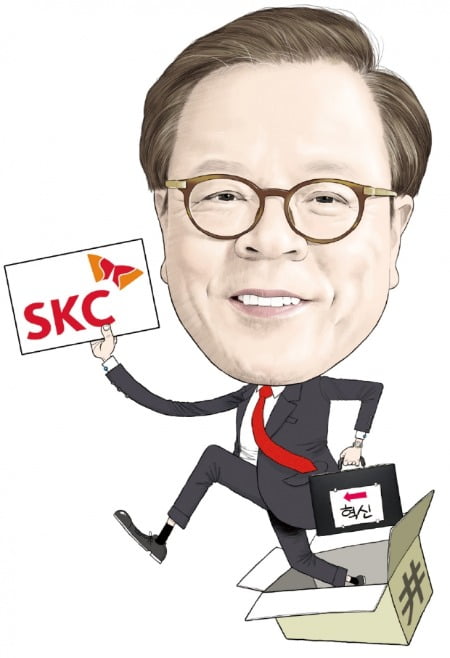NEWS
CEO Special – Wan Jae Lee, SKC
An innovator, transitioning a chemical company into a mobility material company

일러스트=조영남 기자 jopen@hankyung.com
“A spaceship needs velocity to exceed the gravitational pull of Earth. After the initial thrust, 2nd stage propulsion is needed to successfully fly in to space”
Mr. Lee, CEO of SKC, compared SKC to a just launched spaceship. SKC finalized the acquisition of KCFT, a global leading copper foil manufacturer, early this year. Copper foil is a thin _ base_ _ layer_ used as a anode coating substrate, one of the key battery components. While the successful shift into EV materials business, from its tradition film/chemical business, is worth celebration, Mr. Lee called for a 2nd jump, voicing that it is “no time to celebrate.”
SKC initiated its 2nd jump, investing USD 68 million to expand KCFT capacity. KCFT is also reviewing capacity expansion overseas to address demand in the US, China, and EU markets. “2020 is the year we see our business model innovation activity bear fruit”, Mr. Lee says, emphasizing “continued innovation, despite any headwinds.”
Business model change through 3 innovations. It was a blitz. Mr. Lee led SKC’s charge in 3 fronts last year. SKC spun-off its chemical unit to form a JV with PIC, a subsidiary of Kuwait’s national oil company. It also divested SKC Kolon PI, a JV with Kolon Industry. SKC raised over USD 830 million through the 2 deals. Finally, it acquired KCFT, initiating its investment into EV battery material business. It simultaneously achieved 3 major business model shift, transforming the company.
He was not so brave at the very first beginning. When he came to SKC in 2016, he felt SKC survival at stake. The market landscape in SKC chemical business was changing tough with new local competitor and many Chinese p_ layer_s.
Mr. Lee patiently studied the company in the first year after his appointment as CEO. He analyzed the company, categorizing SKC’s business in to 3 segments; One that it can keep operating well, one that it needs to go into, and one that it needed to reduce. He focused especially on business that would become SKC’s new growth driver. After countless hours of meetings, the rechargeable battery was identified as a new growth area. The next step was in-depth analysis of every part of the value chain.
On June 2017, after completion of this analysis, Mr. Lee gathered all of SKC’s management and announced the new path of SKC. As a reader of Chinese classics, Mr. Lee presented ‘Tal-Jeong’ as a management key word, quoting the Chinese philosopher Zhuang Zhou. ‘Tal-Jeong’ translates to ‘escaping from an enclosed well’. Mr. Lee emphasized ‘deep change’, not a shift but a transformation from the core.
“We have been focused on incremental change”, Mr. Lee says, “not being able to drive for substantial change and only focusing on improvements to existing business model.” “Deep change is a drive to change the whole company and its business model, not just product or strategy.”
Drive cooperation through 1-on-1 negotiations
‘Poong-lim-wha-san’ is a phrase from the Art of War by Sun Tzu. It translate to ‘fast as the wind, calm as the forest, fierce as fire, and solid as mountain.’ To win a battle, you need to manage your troops flexibly and accordingly _ base_d on the battle field environment. Mr. Lee started to move in the frontlines, driving for innovation.
Mr. Lee made more than 10 business trips to finalize a global JV with PIC. During these times, PIC’s CEO changed 3 times. In March 2019, during a stalemate in negotiation regarding governance structure, PIC’s executive left the room, jeopardizing JV negotiations. Mr. Lee held the hand of the counterparty, bringing him to his office and started a 1-on-1 talk. After 2 hours of direct, high level talks, the parties came to an understanding and the final agreement was ironed out and signed in August.
Contrary to Mr. Lee’s mild appearance, he shows grit and resilience, according to SKC management. He emphasizes grit and expects employees to have a ‘make it happen’ mentality. This is driven from his belief of ‘making it happen and not giving up’. While calm and composed during work, we opens up and speaks frankly during after hour drinks.
SKC has shown major change since Mr. Lee was appointed CEO in 2016. The loss making film business turned to profit. Total assets increased to 3.97trl. won and debt to equity ratio declined to 129% from 131.4%. Equity market perception has changed as well. Share price more than doubled to 65,000 won in Feb 5. from around 30,000 won in 2016. This was driven by market’s acknowledgement of growth potential, shifting from a stable chemical company to a high growth EV value chain company.
Mr. Lee is far from complacent, further expanding SKC’s business domain. He is driving for localization of blank mask, a core component in the semiconductor manufacturing process. “While there has been headwinds, we have been driving for substantial business model change”, Mr. Lee says. “We will continue to move forward, to see our innovations bear fruit in terms of real results, despite macro headwinds and uncertainty stemming from the Coronavirus pandemic”.
